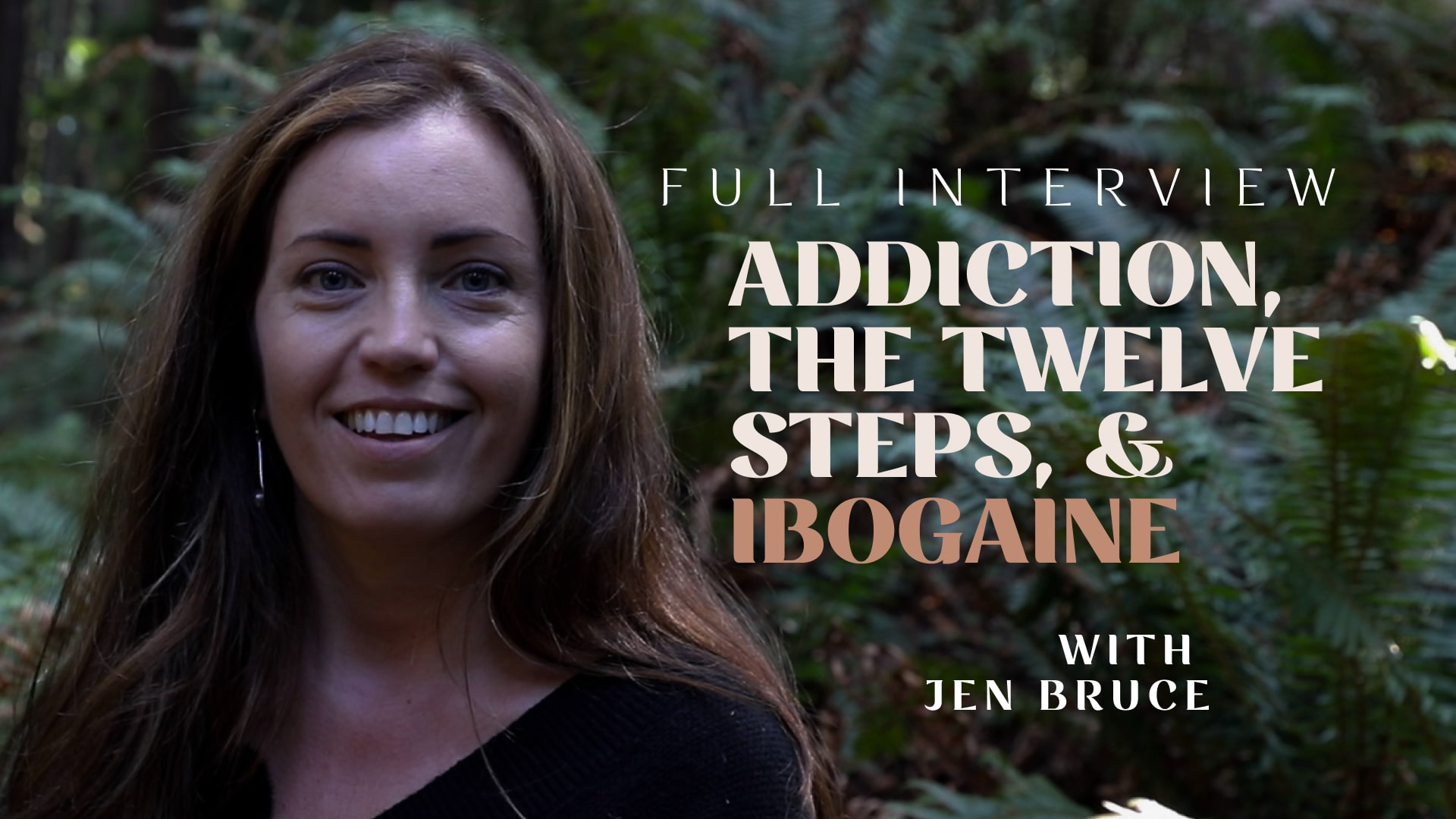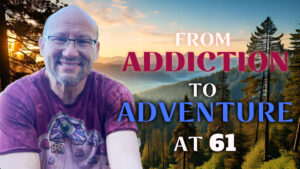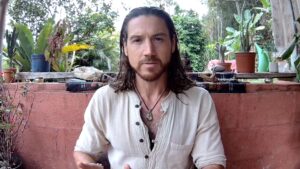Healing From Addiction with Ibogaine || Jen Bruce
About Jen Bruce
Jen Bruce is a functional nutritionist, psychedelic practitioner, author, and activist who specializes in helping people heal themselves from chronic mental and physical health conditions through a trauma-informed lens. Jen is the owner of The Recovery Reset, a coaching program that helps others heal through her signature programs. In this interview Jen talks about healing from addiction with Ibogaine and also with traditional approaches like The Twelve Steps.
Jen has been on her own healing journey for 12 years, successfully overcoming alcohol addiction, depression, and numerous chronic health conditions with the information and modalities she now shares with the world. Read more about Jen on her site.
Jen’s story of recovery
Jen: My name is Jen Bruce and I live in Arcada, California. I’m a member of Decriminalize Nature. I also work in the field. For the last seven years, I’ve been a preparation and integration specialist for people that are utilizing psychedelic medicines for healing from a myriad of different conditions. But generally trauma, addiction, and mental health are my three main ones that I work with. I’m in recovery myself. I was in addiction to primarily alcohol for 17 years. I had been sober for almost 12 years now, January 2nd, 2023.
I was born into a family that carried a tremendous amount of generational trauma. My grandfather and my father, my great grandfather all served in the armed forces. I’m half Irish and half Scandinavian and drinking was a way of life.
At a really young age, I actually ended up leaving home and going on Grateful Dead tour. So at my relatively young age for that era, I was able to experience the psychedelic era that was kind of trailing out from the sixties. And I grew up in Eugene, Oregon, so I had my first psychedelic experiences were within the Grateful Dead community.
There is a lot of beauty, but there was not a therapeutic container and there’s a lot of other drugs and a lot of other things. And due to my family’s background and my wiring and my genes and my entire constellation, I fell into addiction in that scene.
On choosing sobriety with The Twelve Steps
Jen: Fast forward, many years later, I chose sobriety and I really applied myself to the traditional program of 12 step, and it saved my life. And I learned how to not drink and to have my life be manageable. And a lot of really great things started to happen. I got into yoga and that helped me. I’ve been to India many times. I got into nutrition that helped me.
When I started out my journey to sobriety, I was like all of us with addiction stories, diagnosed with depression and anxiety disorder and PTSD.
So you can imagine when you put down your medicine, and in my case, was alcohol. Those things, although they improved, they still remained and like most people with addiction issues, that addictive tendency was still there.
What brought me to my knees and recovery was my work addiction.
So I was five years sober, as a last ditch efforts, before I went the pharmaceutical route and the reason I was not interested in that, as I’d seen hundreds of people around me put on prescription medication and although they may not have been struggling as badly with the symptoms that they were diagnosed with, they also couldn’t feel anything at all.
On finding Ibogaine in Mexico
Jen: I was feeling so bad in recovery, fully applying myself to all the things I mentioned that I felt as a mother of a young daughter, two years old at this time, that that was maybe my only hope to function.
I was exhausted. I had fibromyalgia. They called it chronic pain. I had fatigue. It was just exhausting. And so although I had gotten my life back from alcohol, it wasn’t much of a life to be living.
As a last ditch effort, I went down to Mexico because I’d seen a few people I knew go down for addiction purposes and to get treated by this medicine called Ibogaine, which comes from the country of Gabon in Africa, and Bwiti, the Pygmy people.
I went down. I took the last money I had. I was scared to death. I left my two year old little girl at home. I got ostracized from a 12-step community for choosing to do this because it was a mind altering substance. But I was in a position where if I didn’t alter my mind, I wasn’t going to make it.
The Ibogaine experience
Jen: What happened down there was absolutely magical. I think the first thing that I said after I came out of my experience was that this is the medicine they tell us as people in recovery doesn’t exist. It doesn’t exist, but it did. And the outcome of that experience was that it was a very first time in my life that I’d actually felt good in my own body.
I had no pain. I had no anxiety. I had no fatigue. I had no sadness. I had no depression. I was able for the first time in my life to have a slideshow and have no emotional charge behind it. It was absolutely 100% at peace and ease.
One of the first things that happened after my ibogaine experience was that I could do a slideshow of all the faces and all the people because I’d been through a tremendously long period of painful events for decades and decades of my life.
It’s not to be a victim. Everything is happening for us and I’ve got to learn and grow. So, it’s not like a pity story here. It’s just simply what happened. But I was able for the first time in my life to have a slideshow and have no emotional charge behind it. It was absolutely 100% at peace and ease.
I also realized that I was born in fight or flight response because I was born to a mother who is under a tremendous amount of stress herself while in the womb and we now know this is true through epigenetics. So it gave me the freedom to experience wellness in my own body and ever since then, that’s been my North Star in my life of what I need to do more of to maintain that feeling of wellness and that ability to viscerally experience feeling good in your own skin is so motivating I mean, it’s the greatest relapse prevention tool that I have is because I know how I can feel most of the time and it’s because of that ibogaine.
So I came home, dropped everything I was doing and I’ve been working in this field ever since.
The Twelve Steps program and how can we work in tandem with AA to accept other sacred medicines
Jen: What I will say about that is we don’t need to create anything new for the addiction epidemic.
I have spent much time in 12 step and I love it.
I taught the 12 step workshop to hundreds of people over the years.
I’ve spent lots of time in the yoga community, and there’s wisdom and medicine there. I’ve spent a ton of time in the medicine community now, and there’s so much wisdom there.
I have spent so much time in the nutrition and functional medicine community and there’s so much information there, and there are some things that we have been doing of the traditional model.
My hope is that we can all come together and start seeing the benefits of each modality and how that they can come together, because we do have a full robust, powerful program of recovery.
I know in the studies in Johns Hopkins right now where they’re using one dose of psilocybin, I believe, but in the proper container of setting integration and all the other things, therapy, trauma work that after a year they’re seeing an 80% cessation success rate with alcoholics. I mean, that’s unheard of. We’re looking at about an 8% success rate across the board right now.
What I can personally tell you, not from studies, but from being in these rooms, but that is a true figure.
Every single modality has the same failure rate because they’re incomplete. So the biggest block I see to moving forward and allowing the people that need to access this medicine the most.
I believe addiction is a particular kind of PTSD and nothing more or less. Recovery culture itself needs to stop being so frightened of possibility and embrace those of us that have gone forward and done some experimentation and trust that these experiences are real.
That being said. psychedelic medicines are not going to be for everybody. But we can learn from how these psychedelics are helping the people that are utilizing them within our own process and how to work through our issues in a similar way.
Some of us may not even need to take the medicine if we can just learn how the medicine is working for people and teaching us how to heal ourselves. Because that’s all we’re doing with this work is learning how to heal ourselves.



